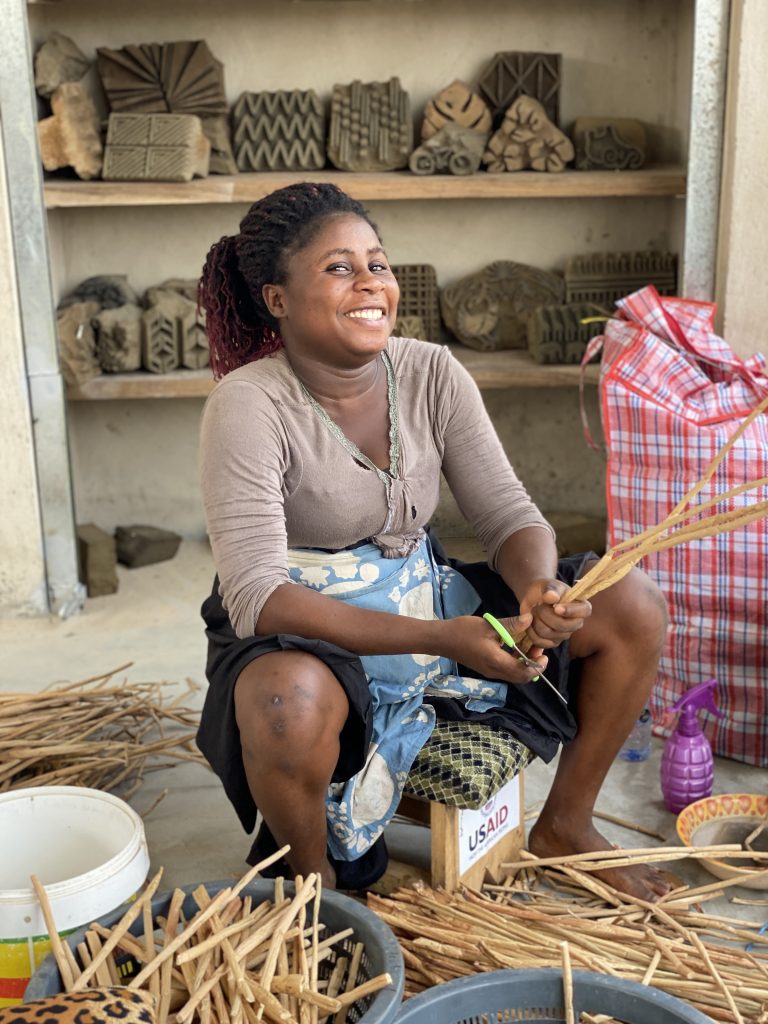By Malik Abdoul, Marketing and Sales Manager, Global Mamas
For over a decade, Ghana’s Volta River has been attacked by the water hyacinth, a type of invasive weed. Dubbed the “poison flower,” this fast-growing plant negatively impacts the ecology within the river and the economic potential of those who depend it for both food and water by severely clogging the waterways.

Perhaps no, one group has been more hard-hit financially by the water hyacinth’s impact than those who sell fish. The dreaded water hyacinth makes parts of rivers impassible by boat, making both catching fish and fish farming extremely difficult for fish sellers and causing a significant drop in income for some, and a complete loss of income for many. Beyond affecting people’s livelihoods, the invasive plant also often stops water from flowing freely within rivers. This means that mosquitoes can lay eggs in the stagnant water, posing a potential health hazard given the many viruses they are known to carry, including malaria.
Doing what they do best, the leaders at Global Mamas identified a problem and saw the opportunity within. Where others saw the hyacinth as a nuisance, they saw a sustainable and versatile production material. To help tackle this problem, Global Mamas have used part of its USAID Trade Hub co-investment grant of $497,000 to equip 25 people, predominantly women, to learn how to harvest the water hyacinth into different paper-like products. The grant was made possible through funding by Prosper Africa, a major U.S. Government initiative to increase two-way trade between the United States and Africa.
Twenty-four-year-old Edith Ahortor was one of Global Mamas’ very first hires for this endeavor. Prior to moving to the Eastern Region, she had lived for some time in the capital city of Accra, where her mother worked as a hairdresser. Because of this, like most Ghanaians and foreigners, Edith wasn’t aware of the ecological problems faced by the communities living closest to the Volta River. However, upon moving to Natriku in the Eastern Region, she quickly heard about the pervasive weed, as it affected everyone from fishmen/fisherwomen, to fish sellers, and even those just wanting to enjoy swimming in the river.
Edith’s new home in Natriku just happened to be located near Global Mamas’ old headquarters, and she learned that the social enterprise was hiring seamstresses. Excited about the opportunity because of her prior experience learning to sew in senior high school, she applied for the position and had her interview on the same day! Two months later, she started work as a seamstress in Global Mamas’ “hyacinth department,” and her first job was to learn how to make an assortment of products using the dried plant.
Soon after, Global Mamas invited consultants to take their hyacinth department staff through training to improve the quality and consistency of their water hyacinth products and to improve the workers’ capabilities. Edith, along with four others, received training on making different kinds of paper of varying quality, in addition to learning how to screen-print on the papers. Edith was quite enamored with the training and found that she really enjoyed screen printing.
“If given the chance, I would like to use the experience and knowledge gained from the training to start a screen-printing business later on,” Edith says. “In the beginning, I’ll probably start alone, and then grow as people become more aware of my business.”
Today, Edith has been able to improve her financial stability. She’s independent and can fully take care of herself. She’s even been able to buy a plot of land, with the guidance of her mother, and intends to build on it in the coming years.
Just as positive, Edith’s accomplishments have encouraged other women in her family to join Global Mamas. With the help of the Trade Hub, Global Mamas aims to support more women like Edith and her colleagues and family members to grow their skillsets, diversify their incomes, and prepare to own their own businesses, should they choose. And, equally important, to help more women learn that even weeds can represent an opportunity.

